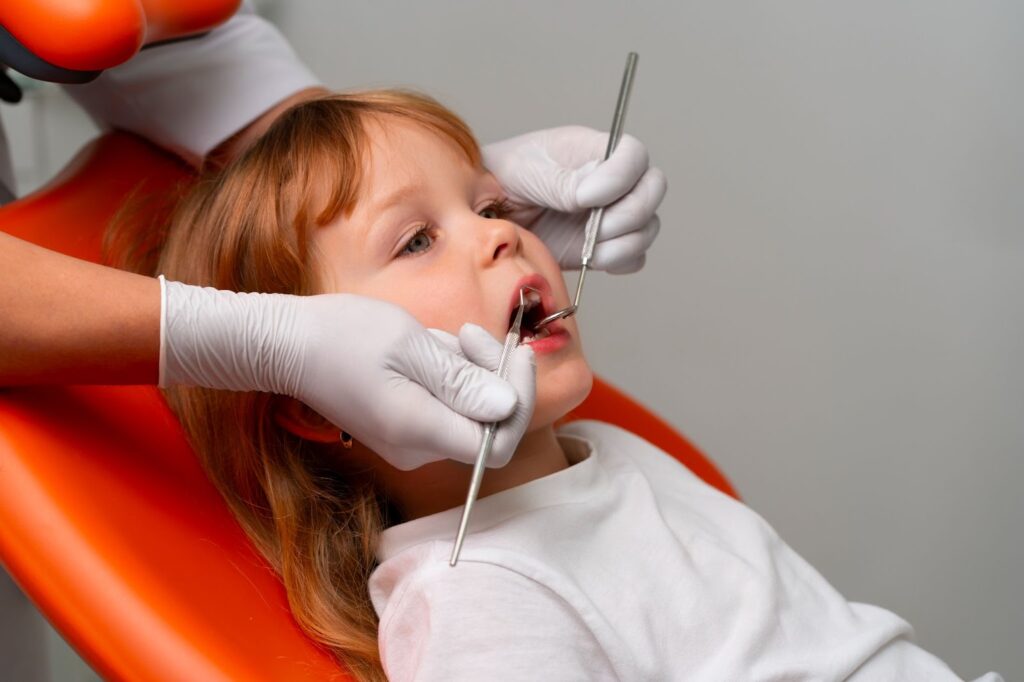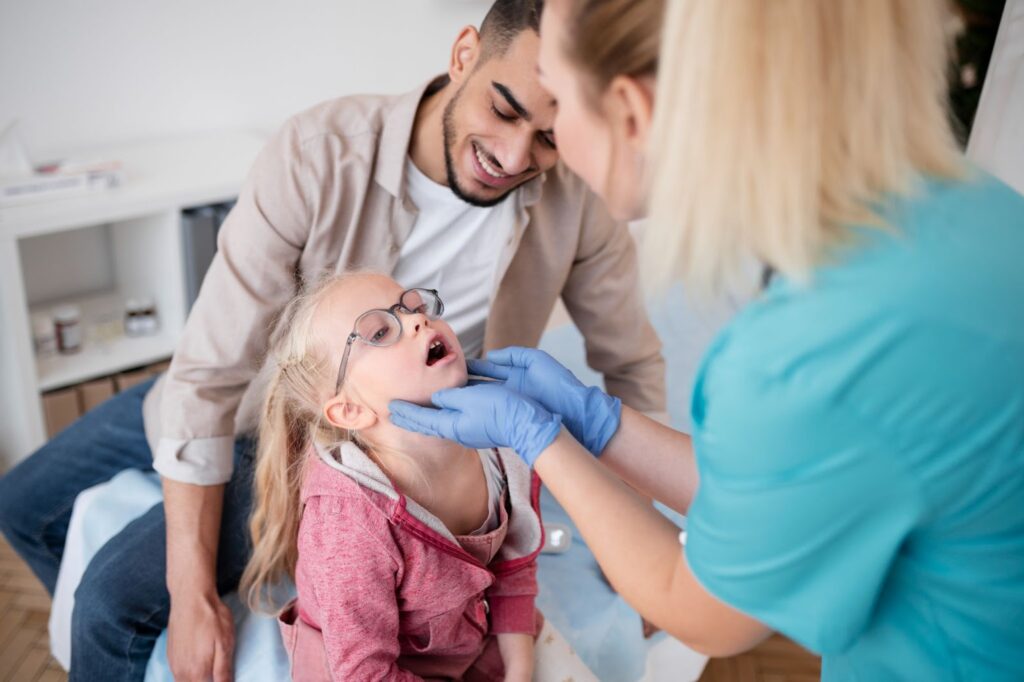
Your Health Magazine
4201 Northview Drive
Suite #102
Bowie, MD 20716
301-805-6805

More Dental Health Articles
What are the Benefits of Early Orthodontic Screening for NYC Kids?
As a parent, you want to give your child every advantage for a healthy and confident future. When it comes to their teeth, most parents think that the journey to a straight smile begins in the teenage years, with a full set of braces. However, modern orthodontics has shown that this “wait and see” approach can often miss a golden opportunity. Many parents think orthodontic treatment is something that happens during the teenage years when all the permanent teeth have come in.
However, dental professionals now recommend that children have their first orthodontic evaluation by age 7. This might seem early, but there are important reasons why catching potential problems sooner rather than later can make a huge difference in your child’s oral health journey.

Why Early Orthodontic Screening is Important
Early orthodontic screening plays a vital role in identifying potential problems with your child’s teeth and jaw alignment before they become more serious. Detecting issues early allows for timely intervention, which can lead to simpler, less invasive treatments and better long-term outcomes.
Orthodontists can use a child’s natural growth to guide the development of the teeth and jaw, helping to prevent complications such as crowding, bite irregularities, or the need for surgery. Starting early sets the foundation for a healthier, more confident smile as your child matures.
What Are the Signs Your Child Might Need a Screening?
Even if your regular dentist hasn’t mentioned it yet, you can look for a few simple signs at home. If you notice any of the following, it might be a good idea to schedule an early screening.
- Early or late loss of baby teeth
- Difficulty with chewing or biting
- Mouth breathing
- Thumb or finger sucking that has continued past the age of five
- Teeth that look very crowded or misplaced
- Jaws that seem to shift to one side or make popping sounds
- Jaws that seem too far forward or back
- Teeth that don’t meet at all or meet in an abnormal way
A family dentistry in Tribeca, NYC, plays a vital role in monitoring a child’s dental development during regular check-ups and determining the optimal time for an orthodontic screening. They also help identify subtle signs of misalignment or jaw growth issues early on, which can allow for timely intervention and prevent more complex orthodontic problems from arising later.
What are the Benefits of Early Orthodontic Screening for NYC Kids
1. Early Detection of Dental Issues
One of the biggest advantages of early screening is finding problems before they become serious. Orthodontists can identify issues like:
- Crooked or crowded teeth
- Overbite or underbite
- Crossbite
- Jaw growth problems
- Gaps between teeth
These problems may not be obvious to parents, especially if baby teeth are still present. But a trained orthodontist can see how the permanent teeth are likely to come in and whether the jaw is developing properly.
2. Guiding Jaw and Tooth Development
During childhood, the jaw and teeth are still growing, which gives orthodontists a unique window to guide their development. Using tools like spacers, expanders, or partial braces, they can create room for incoming permanent teeth and influence how the jaw forms. This proactive approach helps prevent crowding, misalignment, and bite issues.
By intervening early, orthodontists may reduce the need for more invasive procedures later—such as extractions or jaw surgery—making treatment easier, more comfortable, and often more cost-effective in the long run.
3. Correcting Harmful Habits
Certain childhood habits—like thumb-sucking, mouth breathing, or tongue thrusting—can negatively impact dental and jaw development. These behaviors may lead to misaligned teeth, open bites, or even speech difficulties if left unchecked. During an early orthodontic evaluation, professionals can identify these habits and recommend targeted solutions. These might include habit-breaking appliances, myofunctional therapy, or simple behavioral changes.
Addressing these issues early not only protects your child’s smile but also supports healthier breathing, swallowing, and overall oral function as they grow.
4. Improving Speech and Chewing
Proper alignment of the teeth and jaw is essential for clear speech and effective chewing. When teeth don’t meet correctly, children may struggle with pronunciation, experience lisps, or find it difficult to articulate certain sounds. Misalignment can also make chewing inefficient or uncomfortable, affecting nutrition and digestion.
Early orthodontic care helps ensure that the bite functions properly, supporting natural speech development and easier eating. This can lead to improved communication skills and better overall health—both of which are vital for a child’s growth and confidence.
5. Boosting Confidence and Self-Esteem
A child’s smile plays a big role in how they feel about themselves. Crooked teeth or bite issues can make kids self-conscious, especially in social or school settings. They may hesitate to smile, speak up, or engage with peers. Early orthodontic treatment can help align the teeth sooner, giving children a more attractive and healthy smile during their formative years.
This boost in appearance often leads to greater self-esteem, more positive social interactions, and a lifelong appreciation for good oral hygiene and dental care.

What Happens During an Early Orthodontic Screening?
An early screening is not scary or painful. It usually includes:
- A visual exam of the teeth and jaw
- X-rays or digital scans to see how teeth are developing
- Questions about habits, chewing, and speech
- A discussion about possible treatments or next steps
The orthodontist will explain everything clearly and answer any questions you or your child may have. Even if no treatment is needed right away, the screening helps create a plan for future care.
Conclusion
Early orthodontic screening provides NYC kids with a strong start toward lifelong oral health by identifying issues early and guiding timely treatment. It helps prevent serious dental problems, boosts self-esteem, and allows orthodontists to use a child’s growth to their advantage. With the right timing and expert care, many concerns can be avoided or simplified—leading to healthier smiles and more positive experiences for children and their families.
FAQs
What are some common orthodontic issues in kids?
Common orthodontic issues in kids include crowded teeth, overbites, underbites, and crossbites. Early orthodontic screening can help identify these issues and allow for timely intervention and treatment.
At what age should my child have their first orthodontic screening?
Most dentists recommend age 7. This is when permanent teeth start coming in, and jaw development can be assessed.
Does early screening mean my child will need braces?
Not always. Early screening helps identify problems, but treatment may not be needed right away. Sometimes, monitoring is all that’s required.
Other Articles You May Find of Interest...
- Keep Your Smile Bright: Orthodontic Care Tips For the Holiday Season
- Why Istanbul Has Become the Preferred Destination for Smile Makeovers ?
- Perio Protect: A Modern Solution for Gum Health
- Gum Health and Whole-Body Wellness: A Holiday Reminder
- Expanding Smiles Naturally: Guiding Growth With the ALF Approach
- A Clear Path To a Confident Smile
- Keep Kids’ Smiles Healthy During Cold and Flu Season














